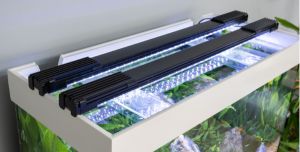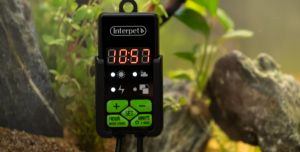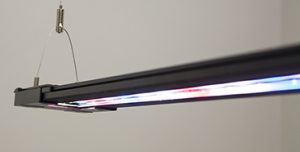Aquarium Lighting

See your fish in a whole new light with our innovative aquarium lighting. Everything you need to keep your aquarium lit from bulbs and fittings, LEDs, lighting controllers. Illuminate your fish tank and create an atmosphere like no other with Interpet’s selection of aquarium lighting. Want to learn more?
-


LEDs
Even brighter and longer lasting Led Aquarium Lighting
-


Lighting Controllers
Aquarium lighting that mimics your fishes' natural environment.
-


Spare Parts
For a long and happy aquarium life.
FAQs
What are the main types of lighting for aquariums?
There are 3 main types of lighting fixtures used in aquariums:
LED lighting: The most common type of lighting. Tried and tested, it’s one of the best options for lighting due to its energy-efficient. You can adjust both the brightness and colour of your lights accordingly.
Fluorescent lighting: Once the most common type of lighting. Provides bright and even lighting needed for healthy plant growth. Bulbs usually need to be changed every six months as they tend to get weaker over time.
Metal halide lighting: Ideal for larger tanks with deep water such as reefs. They’re often more intense than other options. You’ll usually need to change the bulbs every 12 months.
What is the best lighting for a fish tank?
Your tanks size will have a big impact on the lighting system you need, as well as the type of plants and fish you plan to keep. Specific fish like tetras prefer lower lighting levels. While planted aquariums require higher intensity lighting for growth.
Because of their efficiency, LEDs have become a popular choice for home aquariums. You won’t need to change the bulbs and they provided balanced light. A simple LED setup may be all you need if you have a small tank. You don’t want to overload your fish with too much light, as it can cause them stress.
For larger, planted tanks, a full spectrum of metal halide light may be more suitable. For the best result, you want a system that compliments both your plants and fish.
How long should I leave my LED lights on for?
You’ll want to keep your LED lights on for 8-12 hours a day. This will provide ample light to help your plants and fish thrive, while also controlling algae growth.
Too much light can be bad for your aquarium. Not only does it encourage algae growth – which can be harmful for your water – it can also cause stress for your fish.
What is the best way to control aquarium lighting?
For the best results, a lighting controller is ideal for operating your tanks lighting.
Timers allow you to set the duration of your lights automatically, turning them on for the desired time each day. Digital controllers can also be used to gradually increase or decrease light levels throughout the day, simulating natural sunlight patterns,
They can also come with a range of other features including sunrise, sunset features, cloud & lightning options, dimmers and maintenance reminders.
What coloured light is best for fish tanks?
Just like people, fish need light and dark cycles to regulate their internal clocks.
White lights will allow you to see your fish and tank clearly. Where as blue lights are good for plant growth, also compatible with the fish species.
If you’re looking for a evening light, our bluemoon LED is perfect for keeping your fish calm and relaxed. Where as our bright white LED is good for plant growth.
Does lighting affect my aquarium plants?
Aquarium lighting plays an important role in the growth and health of aquarium plants. Too little light can cause your plants to stop growing and become pale, while too much light can lead to algae growth. The best way to ensure that your plants receive the right amount of light is to use a timer. This will allow you to control both the time and power of your lights.
Is it better to leave Aquarium light on or off at night?
It’s generally recommended to leave aquarium lights off at night, as this will help your fish rest and promote natural behaviour. During the night, aquarium lights can cause stress and disruption for nocturnal species and can also lead to algae.
For more information, see our further questions on aquarium lighting.


